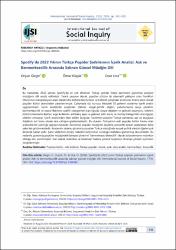Spotify'da 2022 yılının türkçe popüler şarkılarının içerik analizi: Aşk ve benmerkezcilik arasında salınan güncel müziğin dili

View/
Access
info:eu-repo/semantics/openAccesshttp://creativecommons.org/licenses/by-nc/3.0/us/Date
2024Metadata
Show full item recordAbstract
Bu makalede, 2022 yılında Spotify’da en çok dinlenen Türkçe şarkılar listesi üzerinden günümüz popüler
müziğinin dili analiz edilmiştir. Teorik çerçeve olarak, popüler kültüre iki alternatif yaklaşım olan Frankfurt
Okulu’nun manipülasyon aracı olarak kitle kültürü teorisinden ve kültürel çalışmalar ekolünün direniş alanı olarak
popüler kültür teorisinden yararlanılmıştır. Çalışmada söz konusu listedeki 50 şarkının sözlerine içerik analizi
uygulanmıştır. İçerik analizinde araştırılan izlekler; sosyal-politik eleştiri, yabancılaşma (suça yönelim,
benmerkezcilik ve sosyal ilişkilere uzaklık kategorileri aracılığıyla), sosyal değişim ve gelecek tasavvuru, tüketim
kültürü/metalarla ilişkiler, argo kullanımı, eril bakış açısı ve gelenek (dini inanç ve nostalji kategorileri aracılığıyla)
izlekleri olmuştur. İçerik analizinden elde edilen bulgular, incelenen popüler Türkçe şarkılarda aşk ve duygusal
ilişkilerin asli tema olarak öne çıktığını göstermektedir. Bu durum, Türkiye’nin eski popüler kültür formu olan
arabeskle bir yakınlığı çağrıştırmaktadır. Günümüz popüler müziğinin söylemi, semantik açıdan arabeskten daha
yalın kat görünmektedir. Arabeskin aksine, günümüz popüler Türkçe müziğinde sosyal-politik eleştiri öğeleri yok
denecek kadar azdır. Şarkı sözlerinin öznesi, tüketim kültürünün sunduğu metalara gömülmüş durumdadır. Bu
nedenle, günümüz popüler müziğindeki bireysel yönelimi ‟benmerkezci bireycilik” olarak adlandırmanın mümkün
olduğu ileri sürülmüştür. Son olarak, tüketime ve bedensel hazlara yönelik taleplerin direnişe yönelik içerimleri
sorgulanmıştır This article examines the discourse of current popular music by analyzing the list of the most-listened Turkish
songs on Spotify in 2022. Two competing theories about popular culture serve as the theoretical basis for this
article: one from the Frankfurt School, which views mass culture as a means of manipulation, and the other from
the Birmingham Center for Cultural Studies, which views popular culture as a field of submission and resistance.
The study applies content analysis to the lyrics of fifty songs on the most-listened list. The themes investigated
in the content analysis are social-political criticism, alienation (through sub-themes of criminal tendency,
egocentrism, and distance from social relations), social change and vision of the future, consumption culture, use
of slang, masculine point of view and tradition (through sub-themes of religious belief and nostalgia). The
findings obtained from the content analysis show that love and emotional relationships are the main themes in
today’s popular Turkish music. This situation evokes an affinity with arabesque, the older popular culture form of
Türkiye. The discourse of today’s popular music seems semantically simpler than arabesque. Unlike arabesque,
there are almost no elements of social-political criticism in today’s popular Turkish music. The subject of the lyrics
is embedded in the commodities offered by consumer culture. Hence, it is proposed that the prevailing
individualistic tendency in today’s popular music can be called "egocentric individualism." Finally, the implications
of consumption for sociopolitical resistance are questioned.
Source
Uluslararası Sosyal Soruşturma DergisiVolume
17Issue
1Collections
The following license files are associated with this item:


















